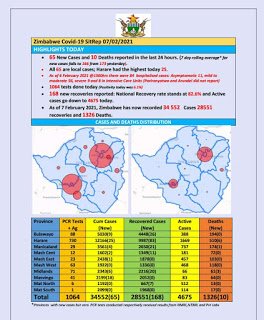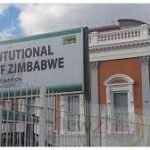…as stronger third wave
beckons
TellZim Reporter
Masvingo province recorded
the second-highest new coronavirus positive cases yesterday, February 07, while
Manicaland reached an alarming daily infection figure of 74 the previous day, TellZim
has observed.
The figures come at a
time the curve of the second wave seems to be flattening, but with experts
warning that a much stronger third wave of infections could be imminent unless
sufficient vaccines are procured in time.
Experts also warn that
it is foolhardy for authorities to believe they are winning the war against the
virus basing simply on the declining infections and fatalities as testing was
still being performed on a limited scale due to lack of resources.
Masvingo province
recorded 18 new cases on February 07, the second highest tally in the whole
country behind Harare which recorded 25.
The previous day,
February 06, Manicaland province had recorded an astronomical 77 new infections
which was the country’s highest for the day, followed by Harare and Midlands
which recorded 26 cases each.
A total of four people
died of Covid-19 in Manicaland’s on February 06, and the number declined to one
death yesterday when only 10 fatalities were recorded countrywide, down from 13
the previous day.
Manicaland has 174
total number of deaths, 737 active cases and 1 349 recoveries.
In Masvingo no deaths
were recorded for two consecutive days, February 06 – 07, with the cumulative
death total holding firm at 64 in a province with 83 active cases and 2052
recoveries.
Harare still maintains
its lead as the epicenter of the virus at 510 total deaths, 1 669 active cases
and 12 166 cumulative Covid-19 cases.
Government says
vaccines that are being procured from Western countries, as well as those
donated by China, will be available free-of-charge to all people who want them.
Meanwhile, South Africa
has suspended a rollout of vaccines developed by Oxford in partnership with
British-Swedish biopharmaceutical giant AstraZeneca.
This followed trials
carried out at the University of the Witwatersrand which showed that the
vaccines’ effectiveness to a coronavirus variant called B.1.351 was
‘disappointing’.
The variant, also known
as 501.V2, was first discovered in that country in January but has been
detected elsewhere across the globe.
There are worries that
the variant, which is now responsible for 90 percent of new infections in South
Africa, could be present in Zimbabwe due to geographical proximity leading to
freer movement of people between the two countries notwithstanding the
lockdowns and the limited border closures.







